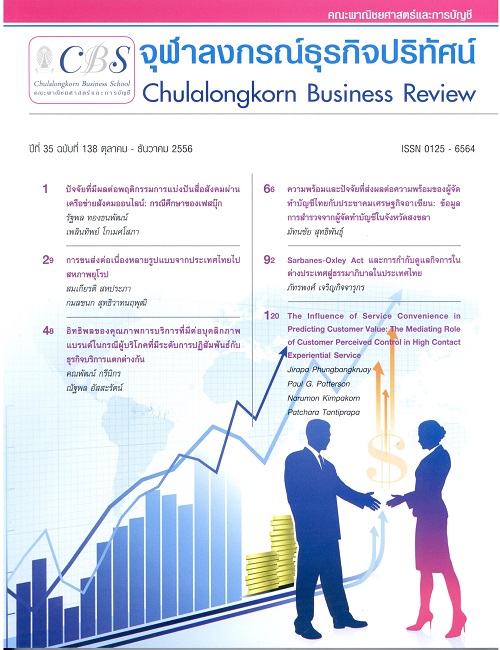Sarbanes-Oxley Act และการกำกับดูแลกิจการในต่างประเทศ สู่ธรรมาภิบาลในประเทศไทย
Main Article Content
Abstract
บทคัดย่อ
Sarbanes Oxley หรือ SOX คือ กฎหมายบังคับใช้กับบริษัทจดทะเบียนในตลาดหลักทรัพย์ของสหรัฐอเมริกา เพื่อปกป้องนักลงทุนจากการตกแต่งบัญชีของบริษัท เพิ่มขอบเขตความรับผิดชอบของ CEO และ CFO ในเรื่องการควบคุมภายในและการรับรองความถูกต้องของการรายงานข้อมูลทางการเงิน โดยมีสาระสำคัญของกฎหมาย 5 เรื่องด้วยกัน คือ 1. ความรับผิดชอบขององค์กรต่อการรายงานทางการเงิน 2. การเปิดเผยข้อมูลในรายงานประจำงวด 3. การประเมินการควบคุมภายในของฝ่ายบริหาร 4. การเปิดเผยข้อมูลปัจจุบันของผู้ออกตราสาร และ 5. บทลงโทษของการปลอมแปลงเอกสาร ซึ่งผู้บริหารและคณะกรรมการบริษัทจะต้องมีความรับผิดชอบต่อความถูกต้องของงบการเงินและมีการเปิดเผยข้อมูลอย่างเพียงพอ ต่อมาในประเทศญี่ปุ่นได้มีแนวทางในการกำกับดูแล โดยใช้ชื่อว่า Japanese Sarbanes Oxley หรือ J-SOX และประเทศในแถบยุโรปใช้ชื่อว่า European Sarbanes Oxley ซึ่งหลักการกำกับดูแลไม่แตกต่างกันกับ Sarbanes Oxley เท่าใดนัก ในขณะที่ประเทศไทย เริ่มนำหลักการกำกับดูแลมาใช้ยุคเศรษฐกิจฟองสบู่ปี พ.ศ. 2540 ที่ต้องกู้เงินจาก IMF อันเป็นเงื่อนไขที่ประเทศสมาชิกที่ขอกู้เงิน จะต้องมีระบบการกำกับดูแลตามข้อกำหนด และนับแต่นั้นมา ประเทศไทยก็ได้พัฒนาการกำกับดูแลกิจการมาโดยตลอด ปัจจุบันตลาดหลักทรัพย์แห่งประเทศไทยได้ยึดแนวทางการกำกับดูแลตามองค์การเพื่อการพัฒนาและความร่วมมือทางเศรษฐกิจ (OECD) และได้มีการปรับปรุงในปี พ.ศ. 2555 ให้สอดคล้องกับหลักเกณฑ์ ASEAN CG Scorecard เพื่อใช้วัดระดับการกำกับดูแลกิจการของบริษัทจดทะเบียนในกลุ่มประเทศ ASEAN ซึ่งจากงานวิจัยหลายผลงานพบว่า การกำกับดูแลสามารถนำมาประยุกต์ใช้เพื่อเพิ่มประสิทธิภาพและประสิทธิผลภายในองค์กร ช่วยพัฒนาขีดความสามารถในการแข่งขันในระดับสากล อีกทั้งยังสร้างมูลค่าเพิ่มของธุรกิจได้อย่างยั่งยืน
คำสำคัญ: การกำกับดูแล การกำกับดูแลกิจการในต่างประเทศ ธรรมาภิบาลในประเทศไทย
ABSTRACT
Sarbanes Oxley or SOX is a governing law enforcing listed companies of American Stock Exchange in order to protect investors from creative accounting and extend scope of responsibility of CEO and CFO on internal control and verification of financial report. SOX consists of 5 areas of legal subject matter including: 1) Corporate responsibility for financial reports; 2) Disclosures in periodic reports; 3) Management assessment of internal controls; 4) Real time issuer disclosures; and 5) Criminal penalties for altering documents, corporate governance guideline that managers and directors had to be responsible for correctness of financial statement with sufficient data disclosure. Subsequently, Japan had a guideline of corporate governance called Japanese Sarbanes Oxley or J-SOX and European Sarbanes Oxley was established in Europe that are similar to Sarbanes Oxley. For Thailand, corporate governance’s principles were adopted in Bubble Economy Era in 1997. Thailand had to borrow some money from IMF and it was the condition that Thailand had to have corporate governance as defined. Since then, Thailand has developed its corporate governance regularly. Currently, the Stock Exchange of Thailand complies with corporate governance of Organization for Economic Co-operation and Development (OECD) and improves its corporate governance in 2012 to be corresponding with criteria of ASEAN CG Scorecard for measuring corporate governance level of listed companies in ASEAN. From several researches, it was found that corporate governance was able to be adopted in order to improve internal efficiency and effectiveness as well as improve universal competitive capabilities. In addition, it is also able to provide value-adding to business sustainably.
Keywords: Corporate Governance, Overseas Corporate Governance, Good Governance in Thailand
Article Details
Opinions and discussions in papers published by the Creative Business and Sustainability Journal (CBSJ) are deemed as personal opinions and the responsibility of the writers. They are not the opinions or responsibility of the Chulalongkorn Business School of Chulalongkorn University.
Papers, content, information etc. appearing in the Journal are deemed to be the copyright property of the Chulalongkorn Business School of Chulalongkorn University. Anybody or any organization that wishes to publish any part of them or use them in any way must obtain written permission from the Chulalongkorn Business School, Chulalongkorn University.


